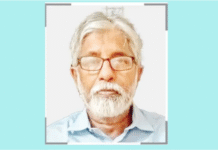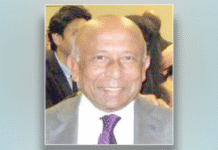Abrar murder and the state of politics
 Once again the question arises, has humanity reached its pinnacle of fellow-feelings, doing good to others and consequently to themselves? This was the question asked by Bertrand Russell and a few other philosophers at the height of the Cold War in the 60s. They asked this question while discussing ideals of education.
Once again the question arises, has humanity reached its pinnacle of fellow-feelings, doing good to others and consequently to themselves? This was the question asked by Bertrand Russell and a few other philosophers at the height of the Cold War in the 60s. They asked this question while discussing ideals of education.
The question recurs today because of the murder of Abrar Fahad, a 21-year-old student of BUET, an educational institution where arguably the students of highest calibre go to study. These students were supposed to dream, to strive to invent something for the future humanity. Instead, some of them have turned to crime, crime that is seriously devoid of sense.
According to the CCTV footage recovered from the BUET campus, those who were involved in the murder were students. They were also members, some of them leaders, of Bangladesh Chhatra League, the student wing of ruling Bangladesh Awami League. They killed the 21-year-old boy apparently because he expressed opinions that went against the ideologies and activities of those in state power. They had already passed a few years as students at one of highest educational institutions in the country. But their political ideology, not education, got the upper hand when it came to action.
This reminds us what the law minister Anisul Huq said at a programme on 28 September. He claimed educated people indulge more in corruption. Since then I haven’t come across any article challenging the observations of the minister, which suggests there is general consensus among the people in this regard. Does this mean our educational system has failed to create human beings, who, being immersed in the mystery and beauty of knowledge, can pursue its infinite realm and thus enlarge our experiences almost infinitely, from summit to greater summits, yet to be achieved?
There are two sets here, people and educated people. ‘People’ is the common factor but the adjective, ‘educated’, has changed the meaning of the minister’s sentence. The noun form of this word is education, which seems to have failed to grab our attention.
For this to happen, education, the acquisition of knowledge, skills, values, beliefs, and habits, must produce people with the power of independent judgement. But this would not happen if we regard education as a means of instilling certain definite beliefs among the students, said Bertrand Russell.
We think saying what the law minister said is akin to shunning his duties and responsibilities, as a very important cabinet member of the government. Instead of blaming people for committing crimes he should have addressed the root cause, namely, the content of education, assessment method etc. Recently, a former chief of research at the BRAC Institute of Educational Development (BIED) in an interview told me that our educational system and assessment method is failing us.
I used search engines, trying to find whether the minister said anything, on and off the parliament, about education, its assessment method before blaming the educated people on 28 September. Not a single such news article came up on the screen.
Instantly, the name of Palan Sarkar from Natore and Narayan, a carpenter from Jhalakathi, sprang to my mind. Palan Sarkar used to hand books to people at their doorstep while Narayan has built a library with his own hard-earned money.
This leads me to the opening paragraph of this article. Rephrasing the sentence we can say, are the politicians making them redundant? We have an example: people adoringly called him Sheikh Saheb or just Mojibur, nothing flamboyant like Bangabandhu or Father of the Nation. Hopefully, we will have politicians who would learn something from this person and act to prevent what happened at BUET.









